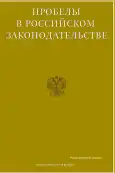Interaction of the Russian Federation with the Republic of China in the Field of Private International Law
- Authors: Kinakh P.I.1
-
Affiliations:
- Moscow State University of Law named after O.E. Kutafin (MSAL)
- Issue: Vol 15, No 6 (2022)
- Pages: 315-320
- Section: Articles
- URL: https://bakhtiniada.ru/2072-3164/article/view/147751
- ID: 147751
Cite item
Abstract
This article explores possible ways of partnership between the two states: the Russian Federation and the People's Republic of China in the field of private international law. The purpose of such a study is to fill the gaps in Russian legislation in the field of PIL, strengthen interstate relations between the Russian Federation and China and develop economic ties between these states in view of the current political situation in the world over the past 5-7 years. The article provides an analysis of the conflict of law rules of the People's Republic of China in connection with which the article of the Chinese scientist in the field of PIL Zou Longmei "Lawmaking and practice in the field of international private law in China" is given. The author of this article conducts a detailed analysis of the regulatory framework of the Russian Federation and the China in the field of private international law, namely, using the comparative legal method, he cites similarities and differences in such regulatory legal acts as: the Civil Code of the Russian Federation, the Law of the China on PIL, the Law of the Russian Federation "On International Commercial Arbitration”, Family Code of the Russian Federation, Labor Code of the Russian Federation. The article also uses the historical method. The author concludes that almost more than half of the PIL institutions (general provisions, persons, property law, law of obligations, inheritance) are regulated in the Russian Federation and China by similar conflict bindings. Differences remain in areas of private international law such as family law, intellectual property issues, and certain aspects of tort and unjust enrichment obligations. In the current situation, it is necessary to turn the eyes of the Russian legislator to the regulatory legal acts of the countries of the Asian world to China, to use the regulatory framework in the field of PIL as an example, but by no means copying, to fill in the gaps in the legislation of the Russian Federation. This article reflects the author's own analysis of the conflict of law rules of two states (Russia and China). This article will be useful to students of law schools, graduate students, teachers of civil, international private, family and labor law, as well as all those interested in the conflict of laws of China and the Russian Federation.
Full Text
##article.viewOnOriginalSite##About the authors
Pavel Igorevich Kinakh
Moscow State University of Law named after O.E. Kutafin (MSAL)
Email: kinah.pavel@yandex.ru
postgraduate student of the Department of International Private Law Moscow, Russia
References
- Averin S.V. Sources of International Private Law of the People's Republic of China // Bulletin of International Commercial Arbitration, 2012. No. 2. P. 14.
- Zou Longmei. Law-making and practice in the field of private international law in China // International Public and Private Law, 2012. No. 6. P. 20 - 21.
- David R., Joffre-Spinosi K. Basic legal systems of our time // Per. from fr. V. A. Tumanova. - M.: International relations, 2009. S. 395, 413.
- Kanashevsky V.A. International private law. Moscow: International relations, 2009. P. 44.
- Ryaguzov A.A. The new law of the People's Republic of China on private international law // International public and private law, 2011. No. 5. P. 44.
Supplementary files








